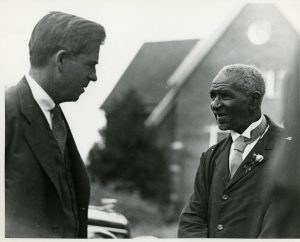
Emily Bibb, curator of the Paul R. Jones Collection of American Art at The University of Alabama, has assembled a small but inviting photographic exhibition from the Jones Collection that displays the talents of two of the most renowned African American men of the early and mid-20th century. P.H. Polk’s photographs in “George Washington Carver: An Uncommon Way,” are on display now through April 30, 2022, in the Pearce Foyer on the second floor of Gorgas Library at UA.

The subject of the photographs, George Washington Carver, headed Tuskegee Institute’s (now Tuskegee University) agriculture department for 47 years, and made groundbreaking innovations in farming and agriculture, most famously with the peanut. During the 1930s and 1940s, Carver was one of the most recognized Black men in America. The photographer, Prentice Herman or P.H. Polk, learned his craft at Tuskegee Institute. He opened a studio in Tuskegee in 1927, taught photography at the school, and eventually became its official photographer. Among his wide range of subjects, including images of the Civil Rights Movement, Polk took photos of visitors to Tuskegee Institute, such as Paul Robeson, Langston Hughes and a 1941 photo of Eleanor Roosevelt that was used to promote the World War II training project, the Tuskegee Airmen. Carver, Bibb writes in her introduction to the show, was probably Polk’s most photographed subject.
Bibb conceived the exhibition as a tribute to George Washington Carver’s “industry and innovation as photographed by P.H. Polk.” Most of the photos exhibited here show Carver at work in his laboratory, his greenhouse, in the fields of his experiment station or giving public presentations on his scientific methods of farming in the 1930s. In the photos, Bibb notes, “Polk conveys Carver’s warmth and enthusiasm through the years as he researched in the laboratory and the field, and taught students and farmers in the community.”
A related exhibition in the north entranceway of Gorgas Library displays images of just a few of Carver’s numerous educational publications, as well as a photo of the Jesup Agricultural Wagon, a mobile “Tuskegee Institute Movable School,” designed by Carver. Gorgas Library hours are Mon.-Fri., 7:30 a.m.-2:00 a.m., with more hours here.
To find out more about The University of Alabama’s programs in studio art and art history, visit our Degree Programs page.